Introduction
In today’s fast-paced digital world, businesses are constantly seeking innovative ways to stay ahead of the competition and drive growth. And one technology that has emerged as a game-changer is artificial intelligence (AI). With its ability to analyze vast amounts of data, learn from patterns, and make intelligent decisions, AI is revolutionizing the ecommerce landscape. From personalized product recommendations to chatbots that provide instant customer support, AI is transforming the way businesses interact with their customers and boosting sales in the process. But it doesn’t stop there. AI-powered algorithms are also helping businesses optimize their supply chain, streamline operations, and gain valuable insights into customer behavior. In this article, we will delve into the exciting world of AI and explore how it is reshaping ecommerce, empowering businesses to unlock their full potential and achieve unprecedented growth. So, buckle up and get ready to discover the power of AI in the world of ecommerce.
The Benefits of AI in ecommerce
Artificial intelligence has opened up a world of possibilities for ecommerce businesses. With AI-powered automation, businesses can streamline their operations and free up valuable human resources to focus on more strategic initiatives.
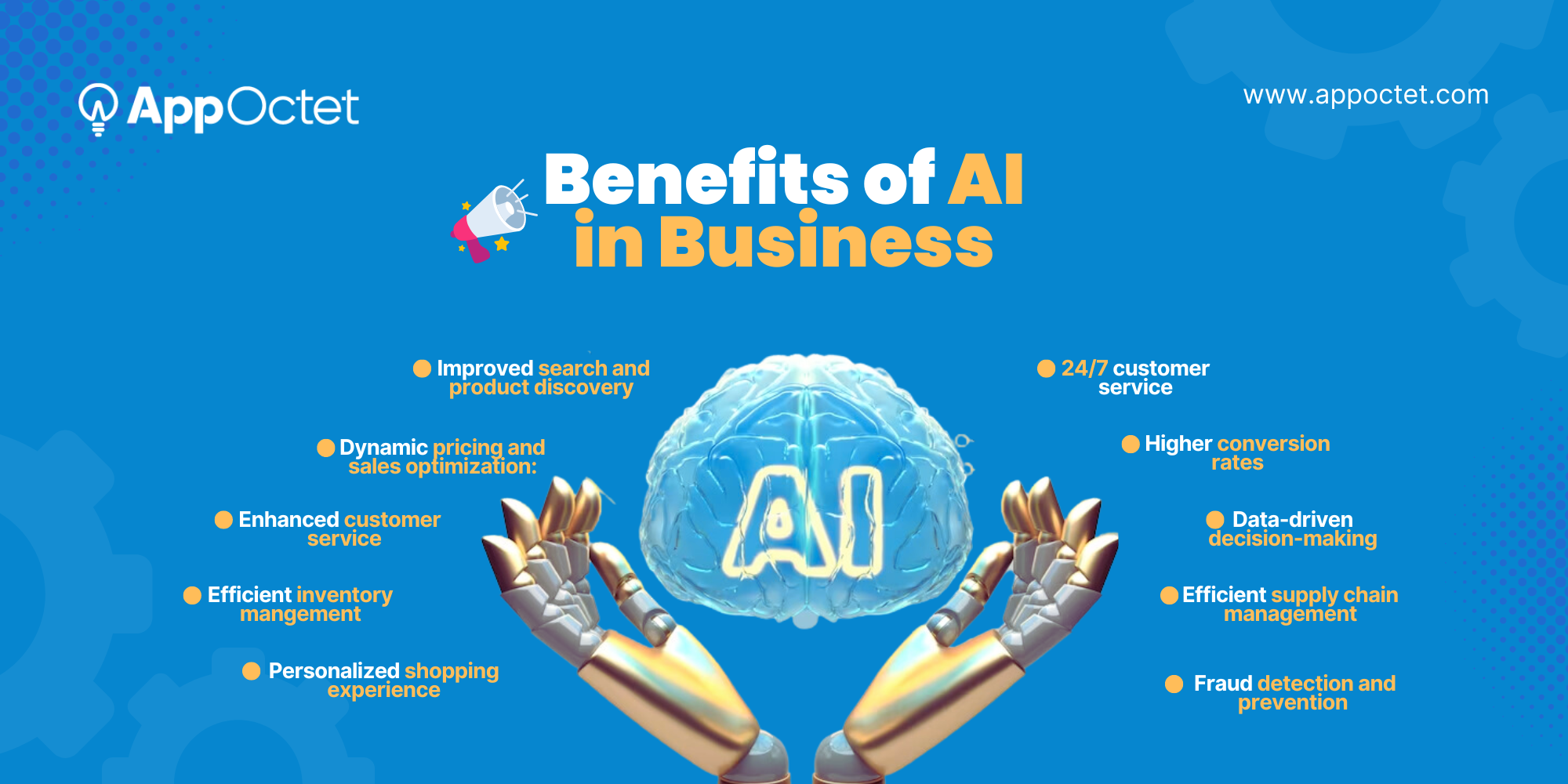
-Personalized shopping experience: AI algorithms can analyze customer data, browsing behavior, purchase history, and other variables to provide personalized product recommendations and targeted advertising. This level of personalization enhances customer satisfaction, increases engagement, and improves conversion rates.
-Efficient inventory management: AI can optimize inventory management by analyzing historical sales data, demand patterns, and market trends. It helps businesses forecast demand accurately, prevent overstocking or stockouts, reduce storage costs, and improve overall operational efficiency.
-Enhanced customer service: AI-powered chatbots and virtual assistants can handle customer queries, provide instant support, and offer personalized recommendations 24/7. These AI systems can understand natural language, address common customer concerns, and escalate complex issues to human representatives when necessary, thereby improving response times and customer satisfaction.
-Improved search and product discovery: AI algorithms can enhance search functionalities by understanding user intent and providing more relevant search results. Additionally, AI can analyze product attributes and customer preferences to offer smarter product recommendations, thereby improving the overall product discovery process.
-Dynamic pricing and sales optimization: AI can optimize pricing strategies by analyzing market conditions, competitor pricing, customer behavior, and demand elasticity. It enables businesses to set dynamic prices, create personalized offers, and maximize revenue based on real-time data and insights.
-Efficient supply chain management: AI can optimize the supply chain by analyzing data related to logistics, transportation, and inventory management. It helps businesses identify bottlenecks, optimize routes, predict demand fluctuations, and enhance overall supply chain efficiency.
-Data-driven decision-making: AI empowers ecommerce businesses with actionable insights derived from large volumes of data. By analyzing customer behavior, market trends, and business performance, AI systems provide valuable information for strategic decision-making, marketing campaigns, and product development.
-Higher conversion rates: AI can significantly impact conversion rates by optimizing various aspects of the customer journey. For instance, AI-powered chatbots can engage with customers in real time, addressing their concerns and providing relevant product information. These chatbots can also assist in completing purchases, making the process more seamless and reducing cart abandonment rates. AI can analyze customer behavior, identify patterns, and personalize the shopping experience, leading to higher conversion rates and increased sales.
-24/7 customer service: AI-powered chatbots and virtual assistants can provide round-the-clock customer support. This 24/7 availability ensures that customers can receive assistance at any time, even outside regular business hours. AI chatbots can handle various inquiries, from basic product questions to order tracking and returns. Businesses can improve customer satisfaction and loyalty by offering instant and consistent support, ultimately driving repeat purchases and positive word-of-mouth.
-Fraud detection and prevention: AI algorithms can analyze large volumes of transactional data and identify patterns associated with fraudulent activities. By automatically flagging suspicious transactions, AI helps prevent fraud, safeguard customer data, and protect the business’s reputation.
Overall, AI in ecommerce enhances the customer experience, improves operational efficiency, enables data-driven decision-making, and contributes to business growth and profitability.
AI Applications in ecommerce:
AI-powered personalization in ecommerce
Personalization is the name of the game in today’s ecommerce landscape, and AI is at the forefront of delivering highly personalized experiences to customers. AI-powered personalization goes beyond simply addressing customers by their names; it involves understanding their preferences, predicting their needs, and delivering relevant content and offers at the right time.
One way AI achieves personalization is through the use of recommendation engines. These algorithms analyze customer data, such as purchase history, browsing behavior, and demographics, to suggest products that are most likely to be of interest to each individual customer. These recommendations can be displayed on the website, sent via email, or even integrated into mobile apps. By providing personalized product recommendations, businesses can increase customer engagement, drive impulse purchases, and boost sales.

AI-driven product recommendations
One of the most visible applications of AI in ecommerce is the use of AI-driven product recommendations. These recommendations are powered by machine learning algorithms that analyze customer data and identify patterns to predict products that a customer is likely to be interested in. By presenting these recommendations at various touchpoints, businesses can increase the chances of conversion and drive additional sales.
AI-driven product recommendations work by leveraging collaborative filtering techniques. Collaborative filtering is a method that uses the preferences and behaviors of similar users to make recommendations. For example, if User A and User B have similar purchase histories and User B has bought a product that User A hasn’t, the algorithm will recommend that product to User A.
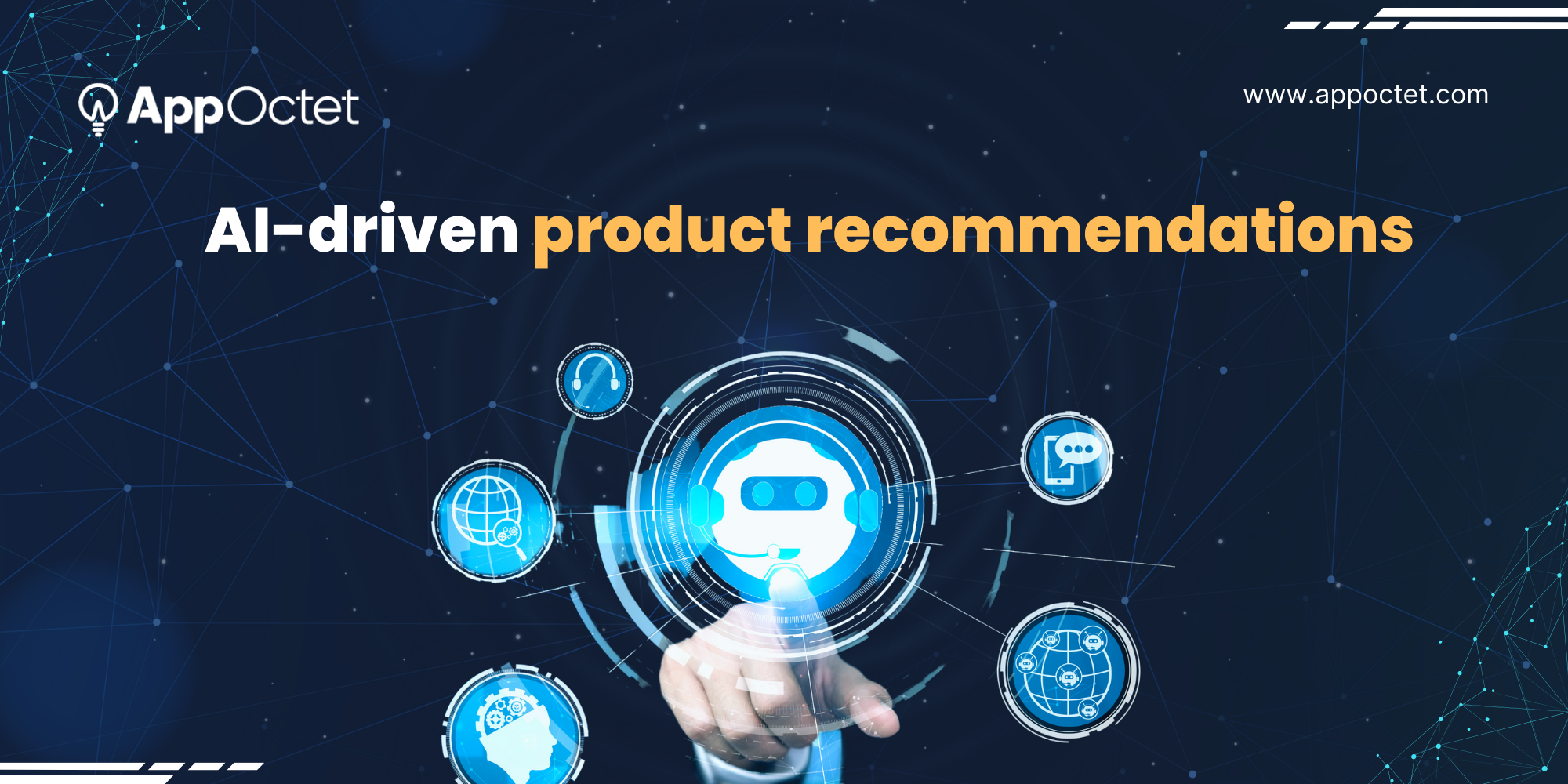
Another approach to product recommendations is content-based filtering. This method involves analyzing the attributes of products and matching them with customer preferences. For example, if a customer has shown a preference for blue dresses in the past, the algorithm will recommend other blue dresses that match their style and size.
The power of AI-driven product recommendations lies in their ability to personalize the shopping experience and increase customer satisfaction. By suggesting products that align with a customer’s preferences and needs, businesses can create a sense of relevance and enhance the overall shopping experience. This, in turn, leads to higher customer engagement, increased conversions, and ultimately, improved sales.
AI chatbots and virtual assistants for customer support
When it comes to customer support, AI-powered chatbots, and virtual assistants are revolutionizing the way businesses interact with their customers. These AI-powered tools provide instant and personalized support, 24/7, without the need for human intervention. Whether it’s answering frequently asked questions, helping customers find products, or resolving issues, AI chatbots and virtual assistants are transforming the customer support landscape.
Chatbots use natural language processing (NLP) to understand customer queries and provide relevant responses. They can handle multiple customers simultaneously, ensuring quick and efficient support. By automating customer support through AI chatbots, businesses can reduce response times, improve customer satisfaction, and lower support costs.
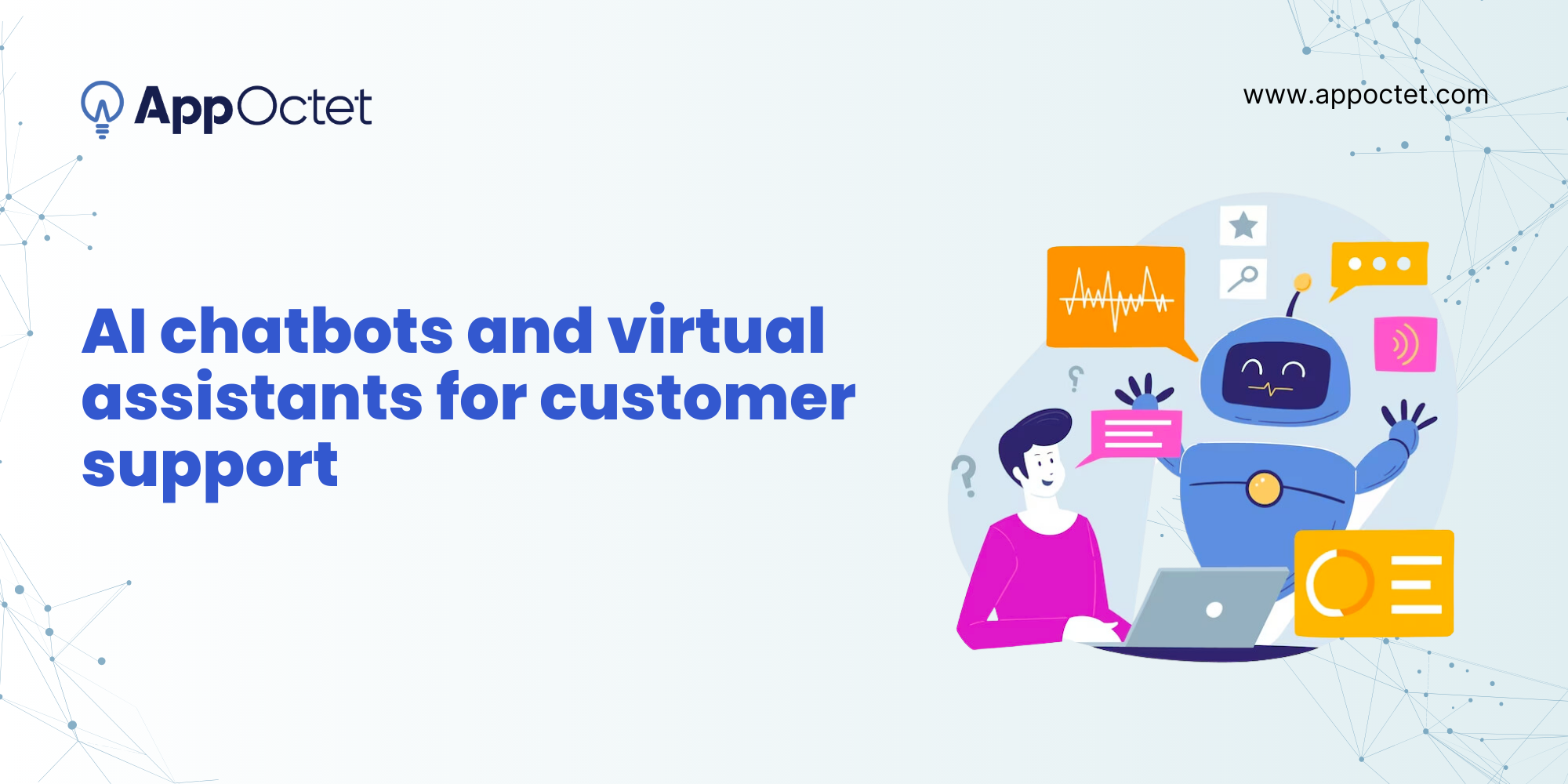
Virtual assistants take the customer support experience to the next level by leveraging AI to understand and interpret customer intent. They can provide personalized recommendations, offer product information, and even complete purchases on behalf of the customer. Virtual assistants can be integrated into various platforms, such as websites, mobile apps, and social media, providing a seamless and consistent support experience across channels.
The benefits of AI chatbots and virtual assistants extend beyond just customer support. They can also collect valuable data about customer preferences, pain points, and behavior, which businesses can leverage to improve their products and services. Additionally, AI chatbots and virtual assistants can help businesses identify and address common customer issues, reducing the number of support tickets and improving overall customer satisfaction.
To know in detail why your ecommerce business needs chatbot read our blog : https://blog.appoctet.com/chatbot-for-ecommerce/
AI-powered Smart Inventory Management
Inventory management is a critical aspect of ecommerce operations, and AI is transforming the way businesses optimize their inventory. AI-powered algorithms can analyze historical sales data, market trends, and other relevant factors to forecast demand accurately. This allows businesses to maintain optimal inventory levels, prevent stockouts, and minimize holding costs.
One of the key benefits of AI-powered inventory management is its ability to adapt to changing demand patterns and seasonality. Traditional inventory management systems often struggle to handle fluctuations in demand, leading to overstocking or understocking. AI algorithms, on the other hand, can continuously analyze data and adjust inventory levels in real time, ensuring that products are available when and where customers need them.
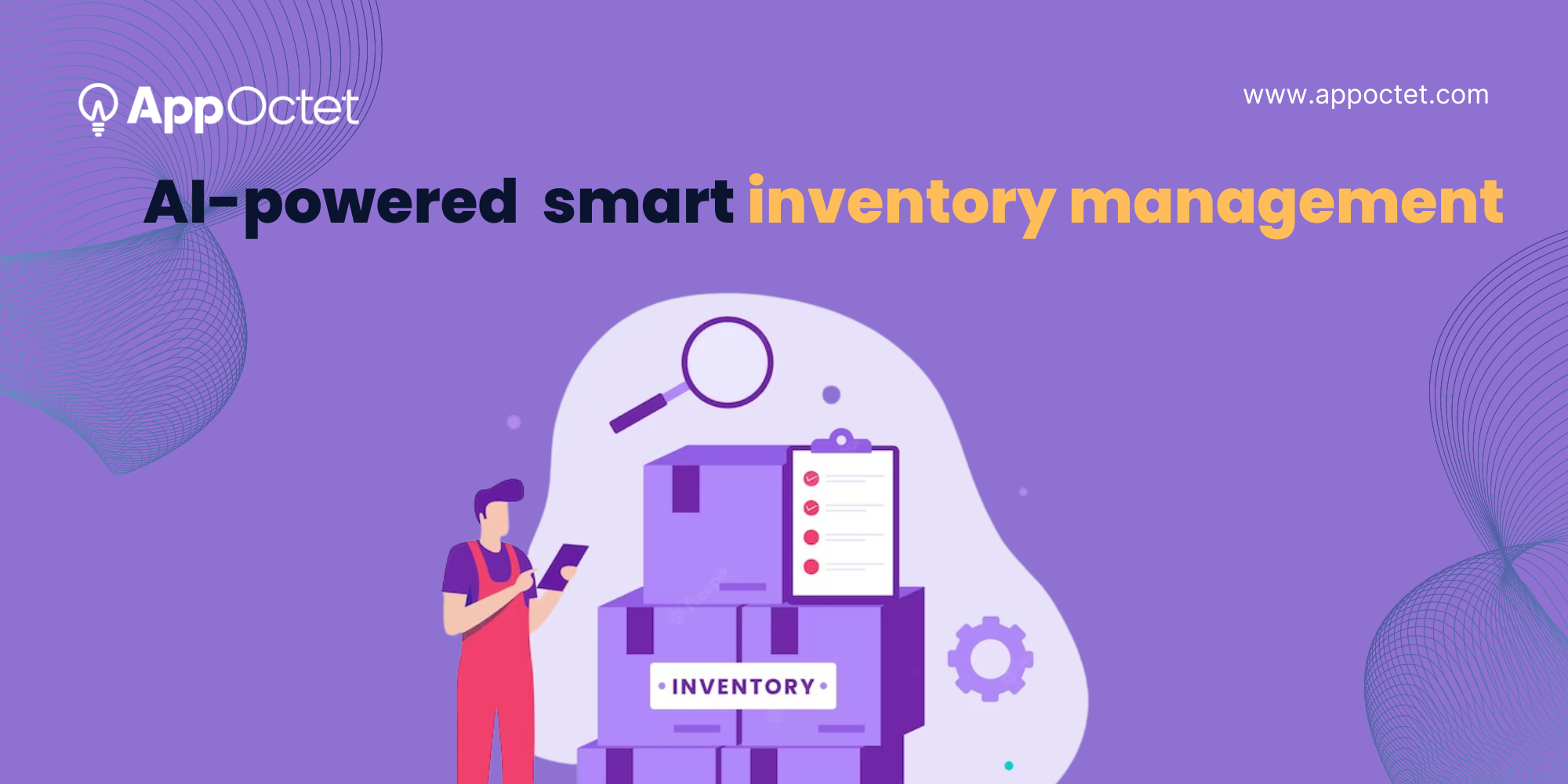
AI can also optimize inventory replenishment by considering various factors, such as lead times, supplier reliability, and transportation costs. By taking these factors into account, AI algorithms can determine the optimal reorder points and quantities, reducing the risk of stockouts or excess inventory.
Furthermore, AI-powered inventory management systems can identify slow-moving or obsolete items, enabling businesses to take proactive measures, such as running promotions or liquidating inventory, to prevent losses. By optimizing inventory levels and minimizing waste, businesses can improve cash flow, reduce costs, and increase overall profitability.
AI fraud detection and prevention in ecommerce
Fraud is a significant concern for ecommerce businesses, but AI is helping to combat this problem by providing advanced fraud detection and prevention capabilities. AI algorithms can analyze vast amounts of data, such as transaction history, customer behavior, and external factors, to identify patterns and anomalies that indicate fraudulent activities.

One of the key advantages of AI in fraud detection is its ability to detect complex patterns that humans may overlook. AI algorithms can analyze multiple variables simultaneously and identify correlations that may not be apparent to human analysts. This enables businesses to detect fraudulent activities in real-time, preventing financial losses and protecting their customers.
AI can also improve fraud prevention by continuously learning from new data and evolving threat landscapes. As fraudsters develop new techniques, AI algorithms can adapt and identify emerging patterns, ensuring that businesses stay one step ahead. This dynamic approach to fraud prevention is crucial in the ever-changing world of ecommerce, where fraudsters are constantly evolving their tactics.
In addition to detecting and preventing fraud, AI can also reduce false positives, which are legitimate transactions mistakenly flagged as fraudulent. By analyzing historical data and customer behavior, AI algorithms can better distinguish between genuine transactions and fraudulent ones, reducing the risk of blocking legitimate customers and improving the overall customer experience.
AI-driven pricing optimization
Pricing is a critical factor in ecommerce, and AI is revolutionizing the way businesses optimize their pricing strategies. AI algorithms can analyze vast amounts of data, such as competitor prices, customer behavior, and market trends, to determine the optimal price points that maximize revenue and profit.
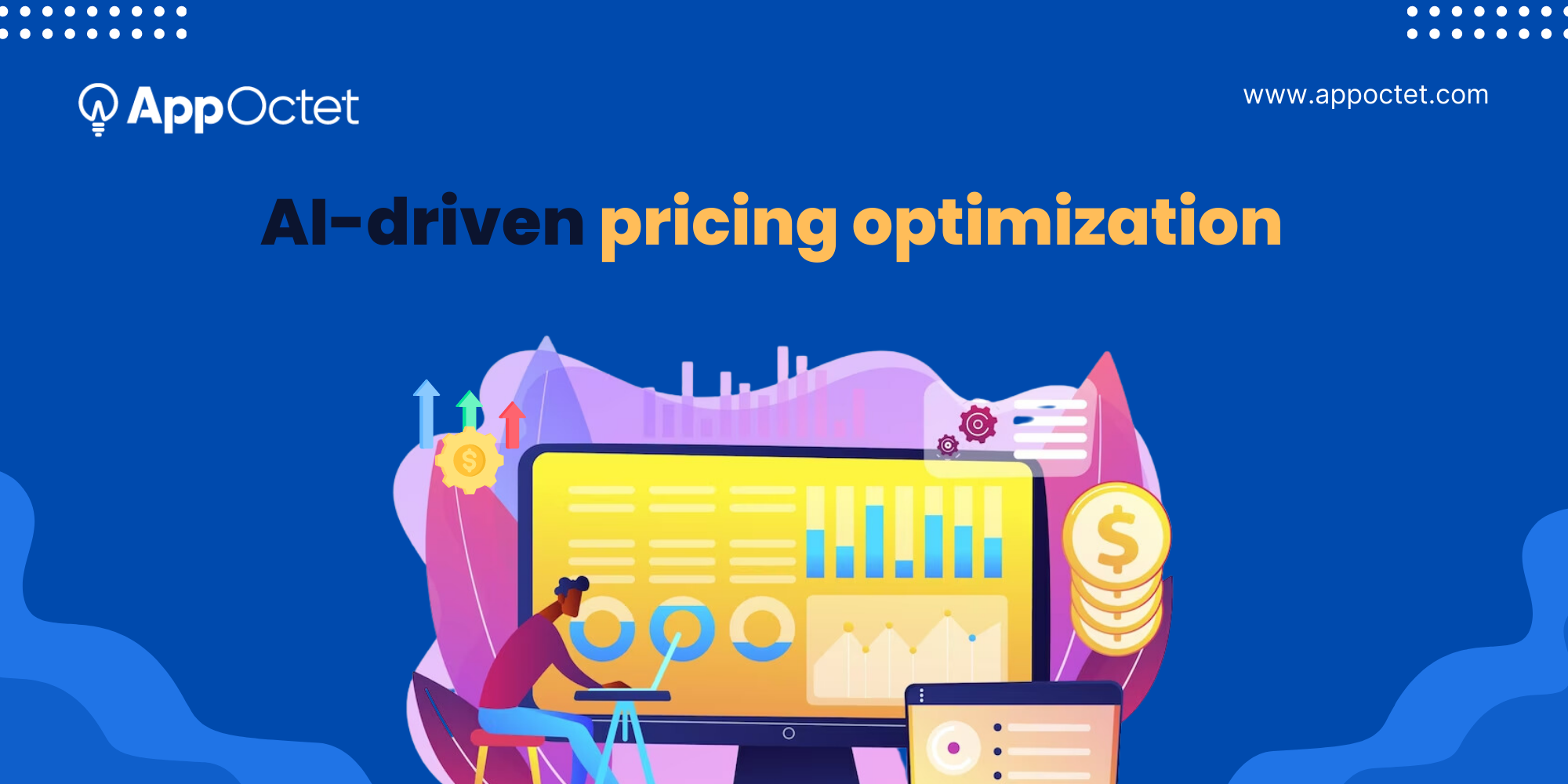
One of the key advantages of AI-driven pricing optimization is its ability to consider multiple factors simultaneously. For example, AI algorithms can analyze competitor prices, demand elasticity, and customer segmentation to dynamically adjust prices in real time. This ensures that prices are competitive, while also maximizing revenue and profit margins.
AI can also personalize pricing based on individual customer preferences and behaviors. By analyzing customer data, such as purchase history and browsing behavior, AI algorithms can offer personalized discounts or incentives to specific customers, increasing their likelihood of making a purchase.
The benefits of AI-driven pricing optimization are significant. Businesses can increase revenue by identifying pricing opportunities, improve profit margins by optimizing prices, and enhance customer satisfaction by offering personalized pricing incentives. Ultimately, AI-driven pricing optimization enables businesses to achieve a competitive advantage in the crowded ecommerce landscape.
AI analytics for ecommerce data
Data is the lifeblood of ecommerce, and AI analytics is transforming the way businesses extract insights from their data. AI algorithms can analyze large volumes of data, such as customer behavior, sales trends, and marketing campaigns, to uncover hidden patterns and generate actionable insights.
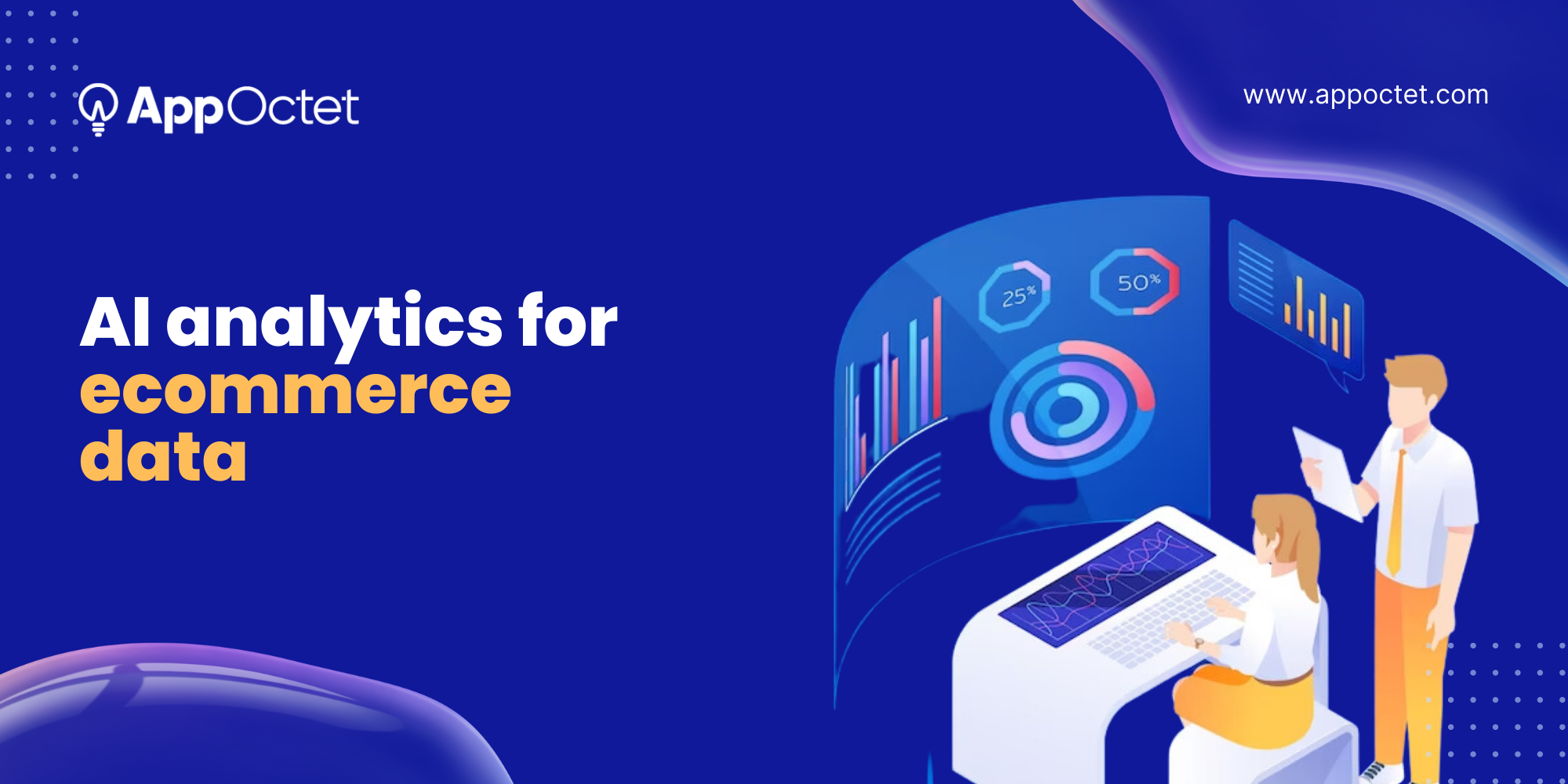
One of the key advantages of AI analytics is its ability to identify correlations and causations that may not be apparent to human analysts. AI algorithms can analyze multiple variables simultaneously and identify complex relationships that may have a significant impact on business performance. For example, AI analytics can reveal the impact of marketing campaigns on customer acquisition, the effectiveness of different product categories, or the correlation between customer satisfaction and repeat purchases.
AI analytics can also predict future outcomes and trends by analyzing historical data. By leveraging machine learning algorithms, businesses can make accurate predictions about customer behavior, sales trends, and market demand. This enables businesses to make data-driven decisions and allocate resources effectively.
Furthermore, AI analytics can automate the process of data analysis, saving valuable time and resources. AI algorithms can handle large volumes of data and perform complex analyses in a fraction of the time it would take a human analyst. This enables businesses to extract insights more quickly and make timely decisions.
Implementing AI in ecommerce: Challenges and considerations
While the benefits of AI in ecommerce are significant, implementing AI-powered solutions comes with its challenges and considerations.
One of the key challenges is data quality and availability. AI algorithms rely on high-quality and relevant data to generate accurate insights and make intelligent decisions. Businesses need to ensure that they have access to clean and reliable data that is suitable for AI analysis.
Another consideration is the need for skilled AI talent. Developing and deploying AI-powered solutions requires expertise in machine learning, data science, and software development. Businesses need to invest in hiring or training AI talent to ensure successful implementation and ongoing optimization of AI solutions.
Furthermore, Ethical considerations are crucial when implementing AI in ecommerce. AI algorithms can make decisions that have a significant impact on customers, such as product recommendations, pricing, and personalized experiences. Businesses need to ensure that AI algorithms are fair, transparent, and respectful of customer privacy. They should also be prepared to address any concerns or issues that may arise from the use of AI in ecommerce.
Case studies of successful AI implementations in ecommerce- Use of AI by Top Ecommerce companies
To illustrate the power of AI in ecommerce, let’s look at some real-world case studies of successful AI implementations.
- Amazon: Amazon is a prime example of how AI has revolutionized ecommerce. The company uses AI algorithms to power its recommendation engine, providing personalized product recommendations to each individual customer. This has significantly contributed to Amazon’s success, driving higher conversion rates and increasing customer loyalty.
- Stitch Fix: Stitch Fix, an online personal styling service, uses AI algorithms to curate personalized fashion recommendations for its customers. By analyzing customer preferences, body measurements, and feedback, Stitch Fix delivers customized boxes of clothing and accessories. This AI-driven personalization has helped Stitch Fix achieve rapid growth and customer satisfaction.
- Alibaba: Alibaba, the Chinese ecommerce giant, uses AI and machine learning algorithms to optimize pricing and inventory management. By analyzing customer behavior, competitor prices, and market trends, Alibaba can dynamically adjust prices and optimize inventory levels, leading to improved sales and profitability.
These case studies demonstrate how AI is reshaping ecommerce and empowering businesses to achieve unprecedented growth.
The future of AI in ecommerce
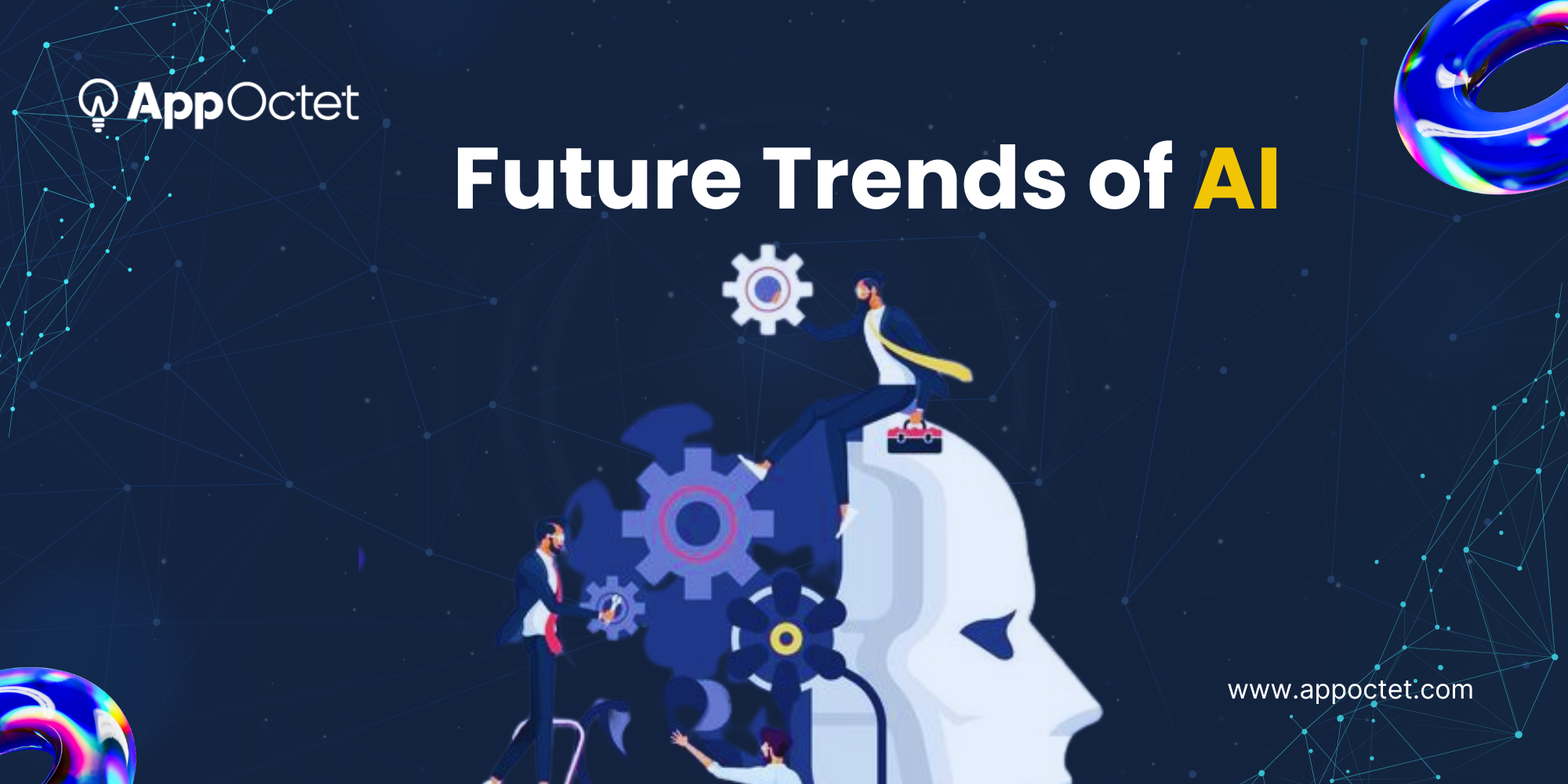
The future of AI in ecommerce is both exciting and transformative. As AI technology continues to advance, we can expect to see even more innovative applications in the ecommerce space.
One area that holds immense potential is augmented reality (AR) and virtual reality (VR). AI-powered algorithms can analyze customer data and provide personalized AR/VR experiences, allowing customers to virtually try on clothes, visualize furniture in their homes, or experience products in immersive environments. This level of engagement can significantly enhance the customer experience and drive higher conversion rates.
Another future trend is the integration of AI with voice assistants and smart devices. As voice technology becomes more prevalent, businesses can leverage AI to provide personalized shopping experiences through voice commands. Customers can use voice assistants to search for products, make purchases, and receive personalized recommendations, all without the need for a screen.
Furthermore, AI-powered chatbots and virtual assistants will continue to evolve, becoming even more sophisticated and capable of handling complex customer queries. Natural language processing and machine learning algorithms will enable chatbots to understand context, sentiment, and intent, providing more accurate and personalized responses.
Conclusion
Artificial intelligence is revolutionizing the ecommerce landscape, empowering businesses to unlock their full potential and achieve unprecedented growth. From personalized product recommendations to AI-powered chatbots and virtual assistants, AI is transforming the way businesses interact with their customers, driving higher conversion rates, and increasing customer satisfaction. AI-powered algorithms are also optimizing inventory management, detecting and preventing fraud, and providing valuable insights into customer behavior. Despite the challenges and considerations of implementing AI in ecommerce, the benefits are significant. As AI technology continues to advance, the future of AI in ecommerce holds even more exciting possibilities.
Unlock the Boundless Potential of Artificial Intelligence in Your Organization! Embrace the Future of Innovation and Efficiency. Reach out to us now to embark on an AI-driven journey and discover endless possibilities for your business!